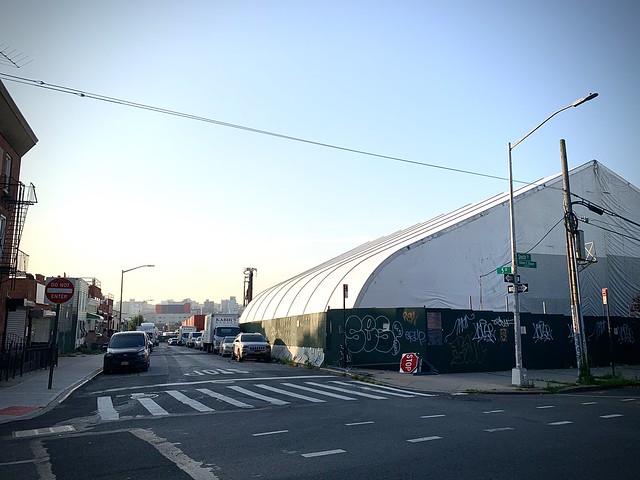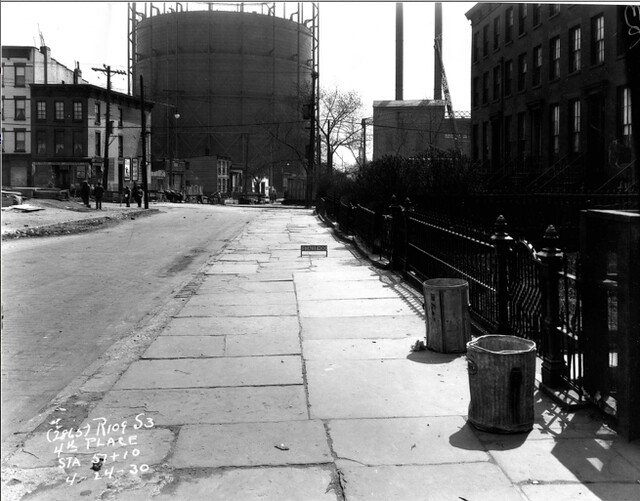
An arial view of the Citizens Gas Work site in 1926


Rendering of proposed Gowanus Green Development on the City owned Public Place lot
Have you ever received a mundane email that seems like bureaucratic nothingness...but after reading it three times...you realize that your Carroll Gardens/Gowanus community has just been wronged for the umpteenth time in decades?
The first notice pertains to Parcels I and II, the 5.8 acre city-owned site at Smith Street and 5th Street.
The second notice is about Parcel III, the privately owned 3.8 acres lot at 459 Smith Street, bounded by Smith Street and Huntinton Street.
The notices are .orders to the environmental clean-up of the very polluted sites that represent "significant changes" to the original one. It's clear, after carefully reading them, that the state has changed course radically: Public Place is now going to get less of a clean up than was originally promised. Instead of digging up and removing 8 feet of soil across the entire 9.6 acre site as initially planned, the State environmental watchdog decided that they will allow National Grid, the polluter, to only dig up 2 feet of dirt on most of the site and replace that two feet with clean soil, which DEC calls a "cover system".
And...they're planning this reduced cleanup since DEC says the site clean-up will be good enough for "restricted residential" use.
All this important information was sent out mere days after John Miller of DEC appeared in front of the EPA Gowanus Canal Superfund Community Advisory Group on July 28th to update the community about the Public Place remediation.
Why didn't DEC tell the community about this reduction in remediation at the meeting? A fear that reporters would latch on and dig into this strange change in course? It's clear EPA was not informed about this change either.
Unfortunately, one of the by-products of this gasification process is coal tar, a black viscous liquid, which is harmful to humans and the environment. Coal tar attaches itself to native soil, and plumes of this dangerous thick liquid can seep in every direction. At Public Place, coal tar has been found in significant amounts at depths of 153 feet.
The following two major classes of chemical compounds found in coal tar were the focus of the Public Place investigation: MGP-related semi-volatile organic compounds (SVOC) namely polycyclic aromatic hydrocarbons (PAHS), and MGP-related non-aqueous phase liquid (NAPL)
When the Citizens Gas Works plant was decommissioned in the 60s, the site was given to the city 'by condemnation' as public land in 1975. Hence the name "Public Place". Citizens Gas Light Company was later sold to Brooklyn Union Gas, which became Keyspan, which is now National Grid.
Since coal tar and contaminated groundwater have been found to ooze from the site into the Gowanus Canal for decades, the US Environmental Protection Agency, which declared the canal a Superfund site in 2010, is also involved.
For the past few months, National Grid's contractors have been working on the site. implementing the remedial design from 2007, which was finalized in 2017 and approved by DEC in 2018.
At many community meetings held by DEC and National Grid in the past years, Carroll Gardens/Gowanus residents were told that the remedial design required:
-the removal of “contaminated soils to a depth of approximately 8 feet below grade."
-the removal of all structures on the site, which include gas holders on Parcel 1and a tar separator on Parcel 3.
- the installation of a High Density Polyethylene (HDPE) liner 2 feet below grade throughout the site as storm water management to prevent rain water absorption, which could dislodge the deeper, remaining pockets of coal tar.
- the installation of a High Density Polyethylene (HDPE) liner 2 feet below grade throughout the site as storm water management to prevent rain water absorption, which could dislodge the deeper, remaining pockets of coal tar.
- two water treatment systems to clean the rainwater so it can can be discharged directly into the Gowanus Canal
- 8 feet of clean backfill and regrading of the land.
- recovery wells that will continue to collect liquid tar that bubbles up to toward the surface.
- 900 linear feet of barrier wall at the water's edge to prevent coal tar contamination from flowing into the Gowanus Canal.
Over the past two years, DEC has already degraded the remedial design by doing away with the impermeable HDPE liner and the treatment systems. (Rain run off will now be collected in trenches running parallel to the barrier wall. However, most of the rain will penetrate the ground, raising the possibility that pockets of coal tar will migrate).
The August 2020 DEC change order is downright scary. The removal of only 2 feet of contaminated soil throughout the site should make all of us very angry and very concerned.
Hasn't the community lived with this dangerous contamination long enough? Can't we expect our own environmental agency to advocate the best clean-up for us?
At the July 28th EPA Superfund CAG meeting, John Miller of DEC explained that in three areas on Public Place, National Grid's contractors dug down twenty to twenty-two feet.
However, when asked about the pockets of coal tar that go down 100-150 feet in some areas of the site, he added:
"Honestly, you are just not going to get down that deep. There is maybe not necessarily a need to do
that."
And then he added: "We definitely want to find out where it's migrating and find out where the limits of the contamination have spread. We have a fair idea of where it migrated, but some additional work is needed off site to button up our investigation."
So, not only is DEC allowing National Grid to scratch the surface of the contamination, but DEC doesn't even know where the underground plume has migrated off-site? Does this mean that it could have oozed under some nearby houses?
Which brings us back to the question of why the site, which will forever be polluted, is being remediated with restricted residential use in mind, when residential use on Public Place is not permitted under the current zoning.
Lander has been in favor of 'Gowanus Green', a 30 story, 900 unit housing development for the site since before his three terms as our councilman. Lander has publicly boasted that the apartments would be 100% affordable, though the site developers contradicted him at a public meeting in December 2019 and could only promise 74%.
But is it dangerous to live on top of the most polluted site along the Gowanus Canal, on top of a huge coal tar plume? Probably, especially if the State allows National Grid to reduce the level of clean-up.
With coal tar remaining deep underground, one of the biggest problems will be semi-volatile and volatile gases. Especially naphthalene, classified by EPA as a possible human carcinogen, is highly volatile and could possibly penetrate into the residential buildings.
The Public Place remediation does not call for a vapor intrusion protection cover. Instead, National Grid and DEC are counting on future building foundations to serve as a protective cap in order to prevent human exposure . But... any fissure in the foundation could lead to vapor intrusion.
So, the question remains: why would NYS DEC allow National Grid to reduce the level of remediation, knowing that our Councilman is pushing for housing on the site?
And...why is Brad Lander not holding a press conference in front of Public Place blasting National Grid and DEC for lowering the level of care if he is intent on bringing families to live there?
Click here for further reading:












.JPG)

6 comments:
100% or 74% "affordable housing" NO ONE should be living on top of this land. It cannot be completely remediated even under the best design. The toxic migrating toxic plume is too deep to dig out. Dangers of vapor intrusion into structures where residents would be living 24/7 for decades are deadly hazardous to health. No one would want to live under those conditions. Unless you had no choice - hence"affordable housing." So this then becomes a social justice issue. Let the poor live on the polluted land. For the DEC, a NYS agency, to degrade the remediation plan puts National Grid off the hook. So when the lawsuits come, and they would eventually - who pays? Our tax dollars? We are watching a crime in action to the community.
That this land remains dangerous forever is supported by the fact that it will need to be monitored in perpetuity. certified once a year by the owner. And problems would need to be addressed. It's one thing to do that with open land, like a park. It's another when you have 900 housing units atop it - the number proposed by the developer Gowanus Green..Nothing green about this deal except the money in profit motive in this land grab.
Let Brad Lander know how you feel about this change. I just did.
The other thing I see wrong with this picture, is that Lander's & DCP have folded the official actions for Public Place into the general Gowanus Rezoning --hiding it from the public review it deserves on it's own.
I believe that there was a stand-alone rezoning started for Public Place that was dropped after a Public Hearing at the BP office. SO how is it now being shortchanged in the present process? This is a Public Place and the Public should be reviewing all the actions taken on a standalone basis.
Has anyone Here been to Williamsburg or Greenpoint...?
“ is it dangerous to live on top of the most polluted site along the Gowanus Canal, on top of a huge coal tar plume? Probably ”
They've been building on top of this kinda thing for years. It’s only a matter of time. And very very disturbing. For our neighborhood and anyone else. 2 ft of dredging isn’t any help.
What do you recommend for showing public dismay at this development(so many double meanings....)?
Thanks,
Sandye
The DEC clean up plan is letting National Grid get away with MURDER, essentially.
Post a Comment